Reimagining desirable living for refugees
How mushrooms are creating well-being and prosperity in the grim reality of the refugee experience
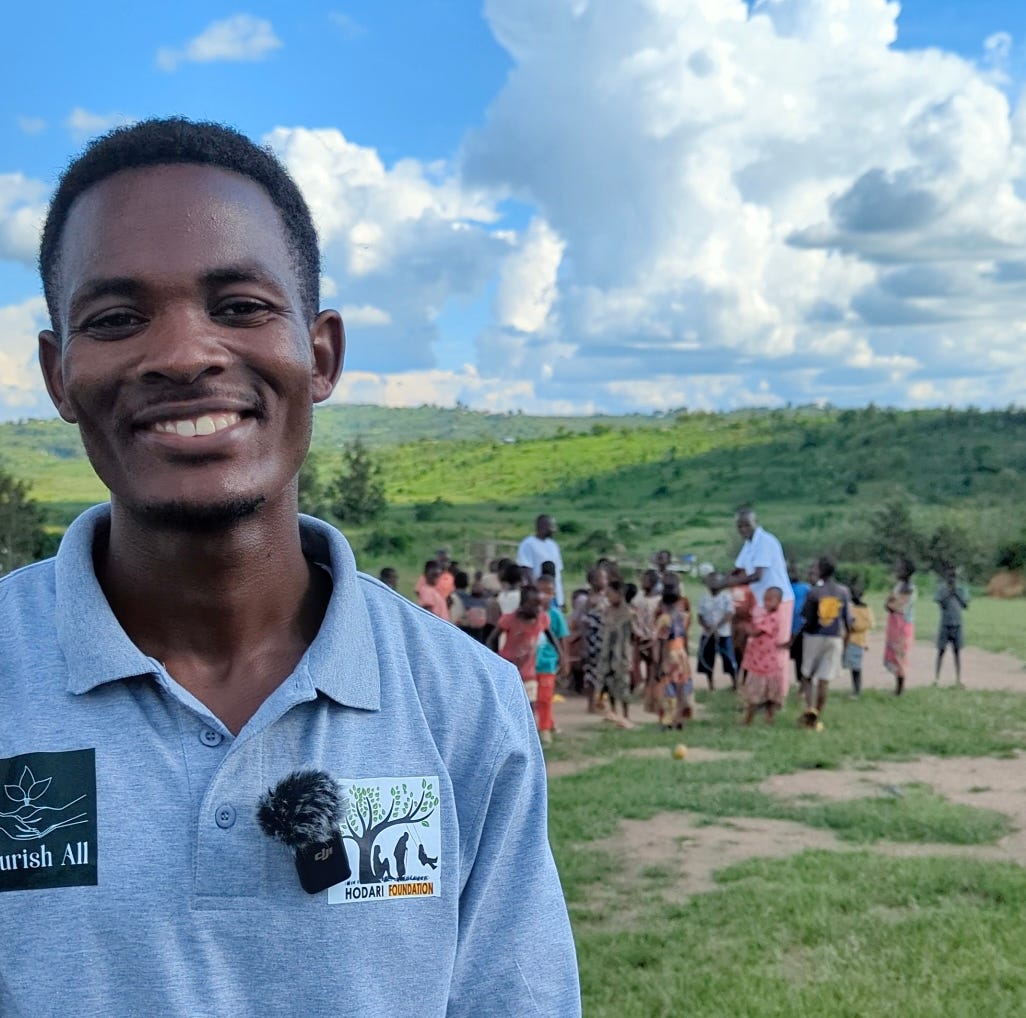
🤓 Reading time: 12 mins - grab a cup of lion’s mane tea!
🎙️ This article pairs up with this podcast chat here, with my guest Janvier Hafasha
TL/DR Please consider supporting the amazing work of Hodari Foundation here - there are so many ways to get involved!
The world is all backwards sometimes
Picture a fertile green landscape of rolling tropical hills. Cabin-sized homes scattered on the hillsides look out over the valley road, a striking orange clay track winding along natural contours. There are no straight lines, for where is there ever a straight line in the natural world? Peppered with subsistence-size farms lush with organic corn, plantains, matoke, cassava, sweet potatoes, millet, beans and groundnuts, there is no monoculture here.
“The world is all backwards”, my sound guy (and husband) claims from the front seat of our ride. I ask him to clarify. “Londoners would pay an arm and a leg to live like this. AirBnbs with this view cost a fortune”. He’s right, and it’s complicated. There are lessons to be learned here, I mull on as we pull over a hill overlooking Kyaka II refugee settlement.
We’re in southwestern Uganda, en route to meet a group of mushroom farmers. Today we will learn from our hosts, the NGO Hodari Foundation, how mushrooms can profoundly change the lives of refugees. Before we do that: back to this idea of the world feeling backwards.
Desirable living, and who is responsible
This backwards-ness is playing out in a couple of ways: in the nuanced idea of what desirable living means to people; and in where the onus lies to create a world where desirable lifestyles are available to everyone.
While ‘progress’ and population growth have given rise to cities and their largely unsustainable food systems, many in the ‘developed’ West are exploring ‘new’ ways of living: a quick search of off-grid, homesteading or eco-village proves how desirable grow-your-own, community-based lifestyles have become for Westerners.
In this region of Uganda, communal living and mindful consumption are the norm. Subsistence farming is organic and sustainable while promoting biodiversity. In theory, the people we are visiting are living the new European dream; but in a contrasted harsh reality, are confined by the refugee experience. This is the backwards-ness breaking my brain today.
Plans for people, planet and prosperity
The UN’s 2030 Agenda for Sustainable Development is ‘a plan of action for people, planet and prosperity’, and recognises that freeing humans from poverty is the greatest global challenge—a crucial part of its 17 Sustainable Development Goals (SDGSs). These SDGs are ambitious.
As is often the case with diffused responsibility: where does the onus (actually) lie to do the work of lifting people out of poverty and avoiding total climate crisis: Heads of state? Heads of households??
Communities can change their world
Our visit with Hodari Foundation showed me that heads of community-based organisations facing extreme challenges have immense power to affect change.
Hodari Foundation is a refugee-led community-based organisation promoting and defending the rights and well-being of those with refugee status in Uganda. I’m intentionally saying ‘those with refugee status’, because ‘refugee’ is not an identity, but a status.
Founded by Janvier Hafasha, an inspiring young leader living with refugee status in Uganda after fleeing his home in the Democratic Republic of Congo (DRC) at 17, Hodari’s impact is profound and powerful. Sustainable agriculture, growing mushrooms, enterprise development and caring for orphaned children are just the start of their activities; while demonstrating the permaculture ethics of earth care, people care and fair share.
Hodari is creating the possibility for equitable, desirable lives, free from poverty and food insecurity and more adaptive to climate change, specifically for marginalised groups in the settlement.
Self-sufficiency and resilience aren’t just buzzwords: people need to earn and to eat.
“We are a Refugee-led Community-Based Organisation that deploys a Human-centred-Design Approach and a Theory of Change to Support the Resilience of livelihoods of refugee children, women and youth including those with disabilities and the host community in Kyaka II refugee settlement.”
- Hodari Foundation
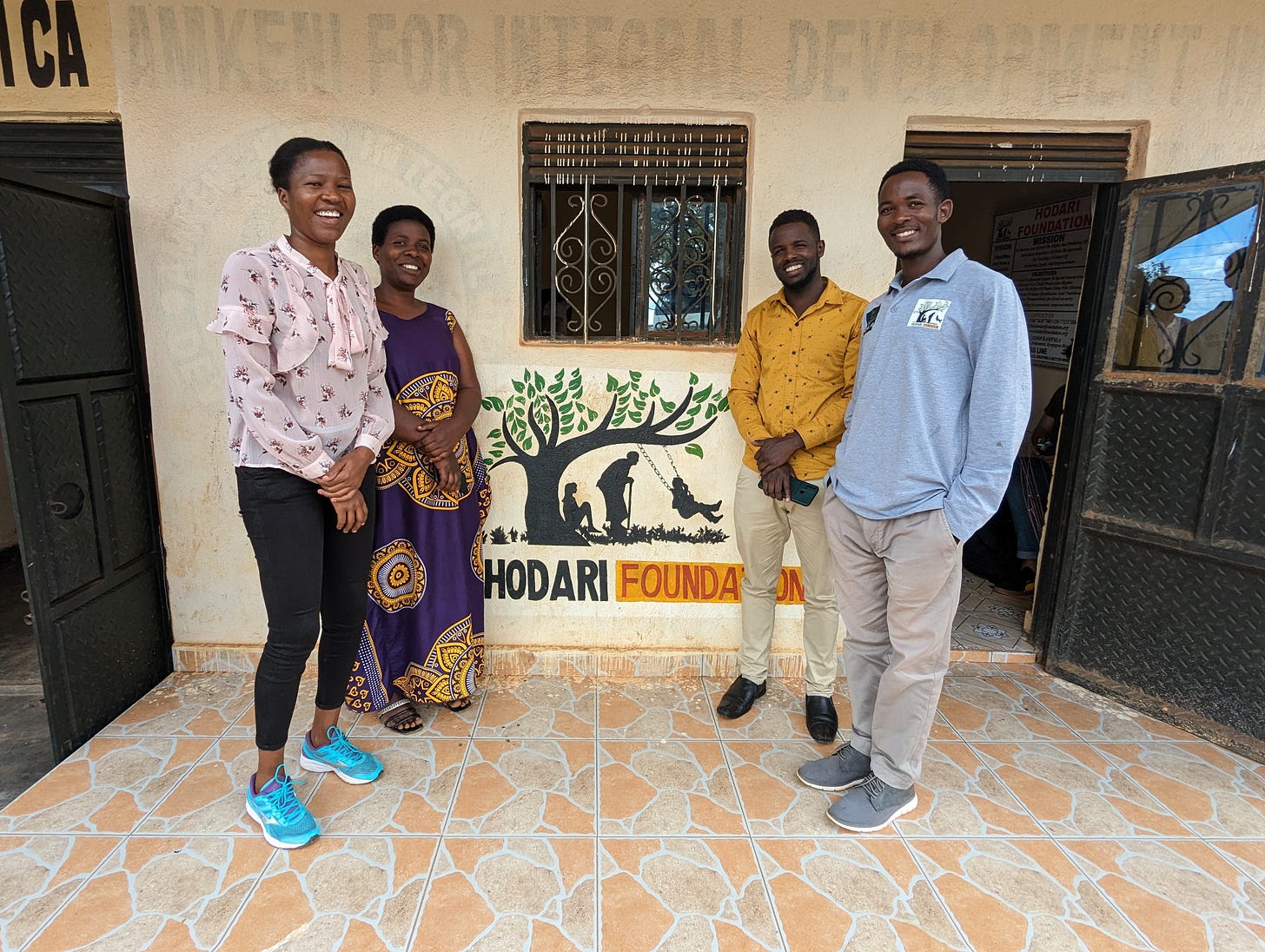
Mushrooms for people
For Furaha Confiance, Chairperson of Kyaka II refugee settlement’s Hope Mushroom Initiative, mushrooms provide food security and self-sufficiency. Furaha takes us inside her grow room: packed floor to ceiling with wooden shelving and home to 100s of mycelial ‘gardens’; each with the potential to harvest over 1kg fresh oyster mushrooms. The mud and brick walls act as insulation and the ceiling has intentional airflow gaps — it’s glorious stepping into this cool room in the equatorial heat!

Hope Mushroom Initiative are a group of people, mostly women, living as refugees and being trained in mushroom growing as beneficiaries of the Hodari Foundation. Furaha introduces her 12-member team, each with their roles and activities in the mushroom farm, while also managing side businesses like selling tomatoes or tailoring clothes.
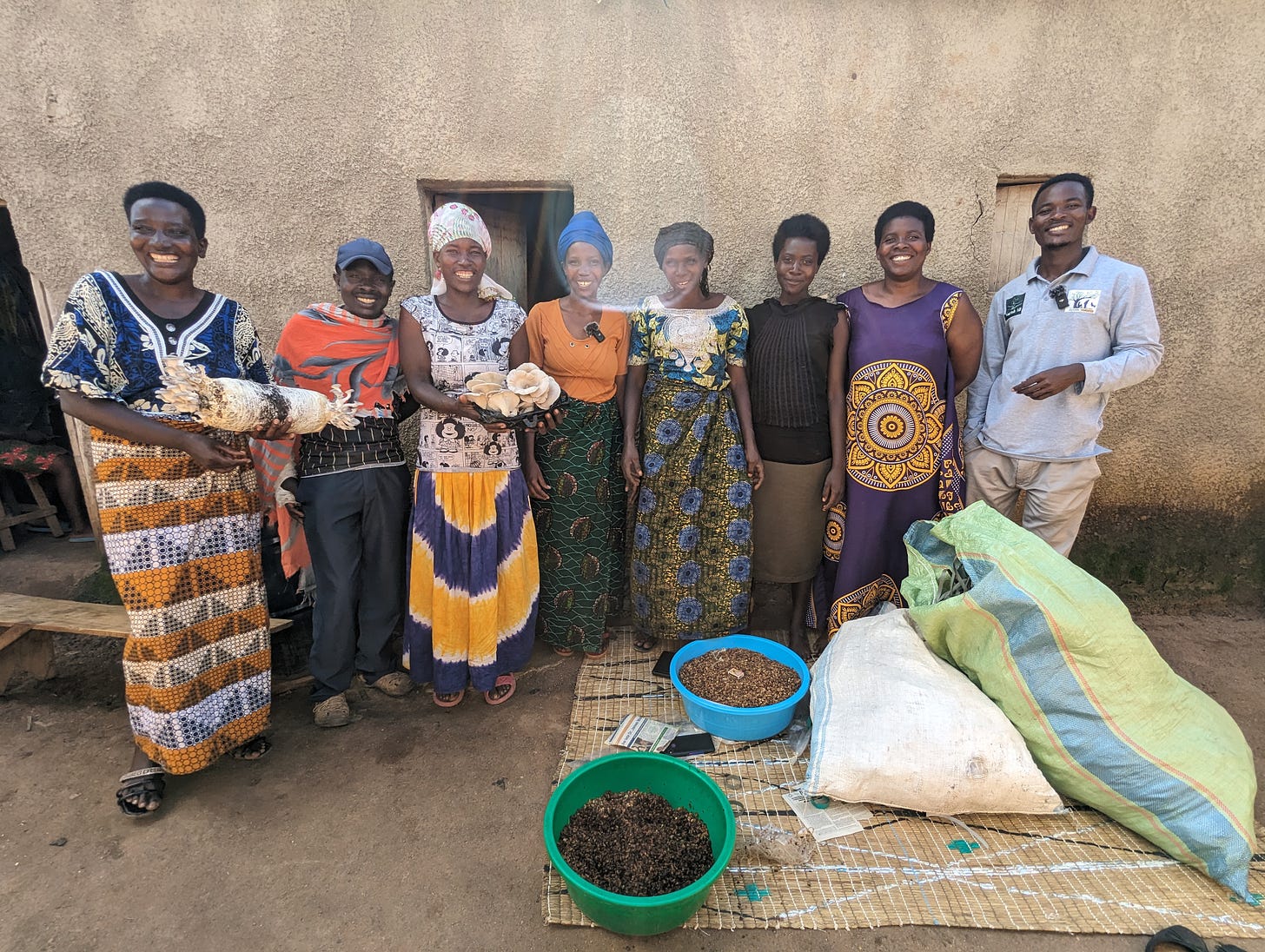
It’s a capacity-building system: through the support of key organisations like Swisscontact and Hodari’s funder and strategic partner Nourish All, capacity is built through training in mushroom growing, grant writing, business and accounting tips etc. Nourish All has assisted with being able to spread the model (fund more training groups), improve it (providing crucial lab equipment and higher quality driers) and expand it (into grain spawn).
[Check out my very first podcast chat with Samantha Koches of Nourish All here!]
These skills have been imparted to the Hope Mushroom Initiative leadership, who in turn have trained their teams. After two seasons, two of Furaha’s members are ready to launch their own mushroom farms and continue the system.
“When we feed our children mushrooms, they get enough natural, organic protein to grow healthily. Growing it helps us, as foods like meat are very expensive. Now we can eat mushrooms instead of meat or fish, and reduce our expenditure.”
- Furaha Confiance, Chairperson of Hope Mushroom Initiative
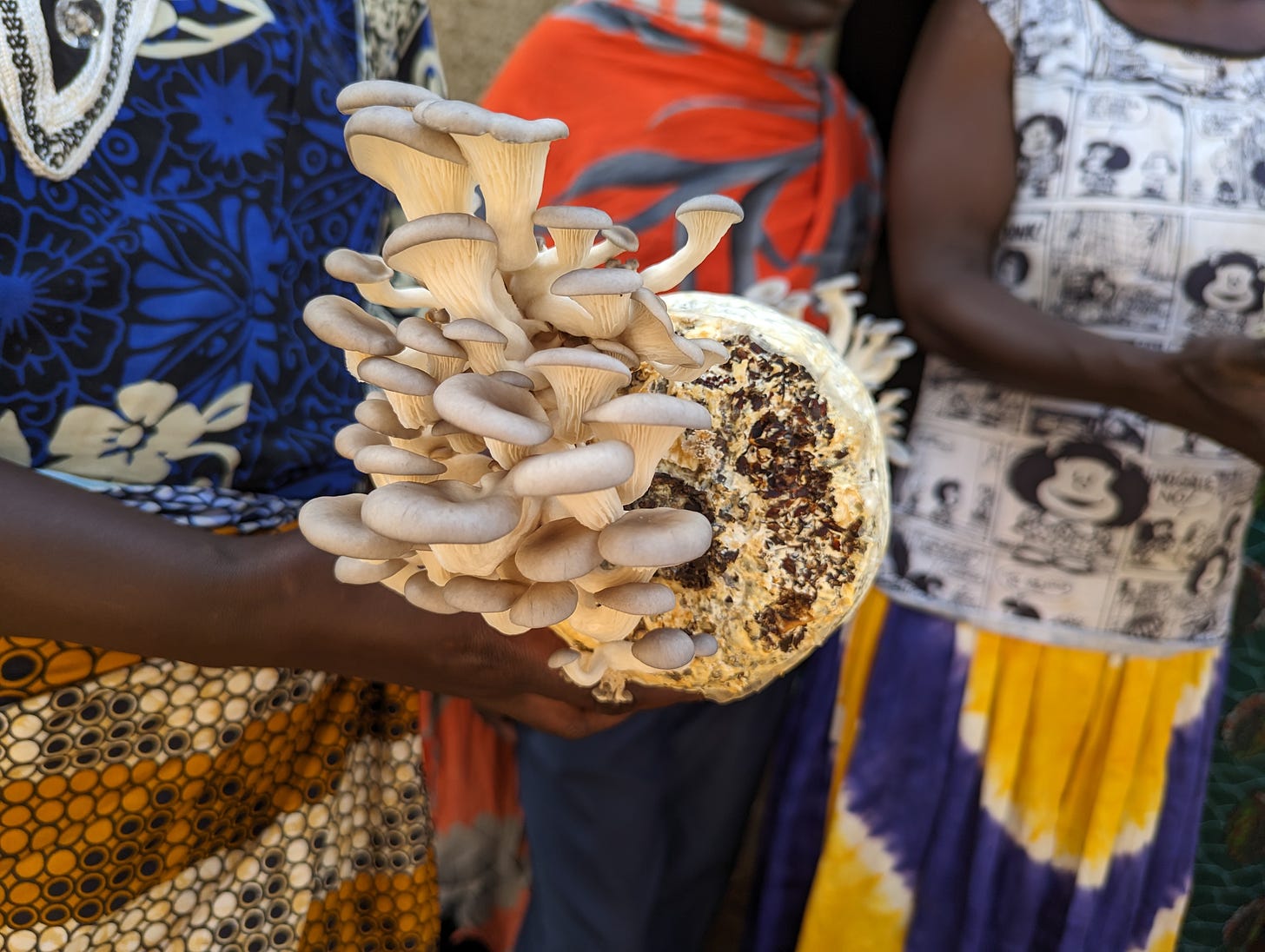
Mushrooms for prosperity
In Kyaka II, people like mushrooms. There aren’t many fruiting bodies in the grow room: as soon as mushrooms are ripe they’re harvested and sold to existing customers and new neighbours. Furaha and her children’s favourite recipes—like freshly fried oyster mushrooms with tomato, cassava and maize bread—are shared with the community in an ever-expanding word-of-mouth campaign about the tasty and nutritional benefits.
Increasingly Janvier’s team is expanding the product portfolio into more ways to create value: mushroom porridge, mushroom soup, mushroom coffee, mushroom jelly (for the skin), and even a mushroom wine! (which I got giddy about)
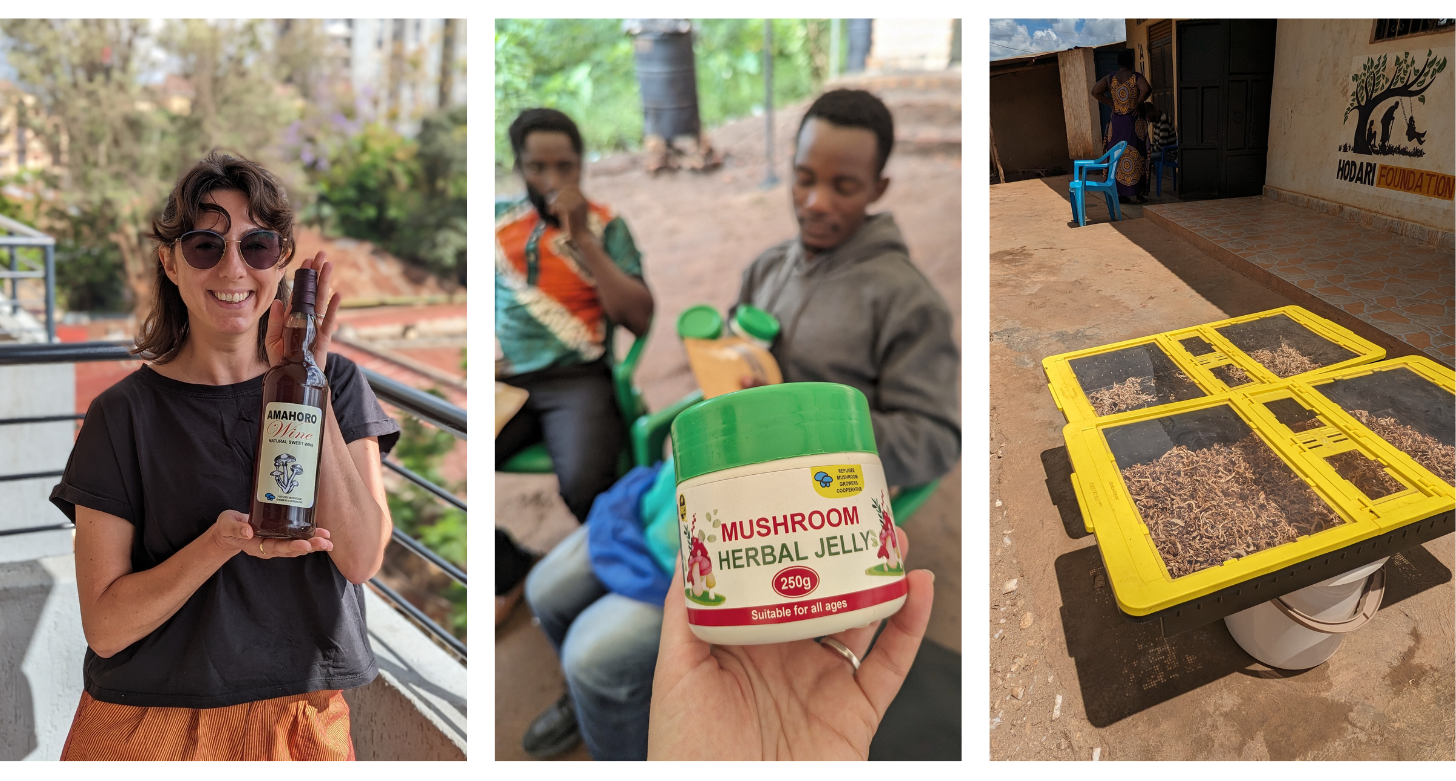
It’s a profitable enterprise: one mycelial ‘garden’ can produce at least 1kg of fresh oysters which sells for 8-10,000 Ugandan shillings (UGX), depending on whether Hope Mushroom Initiative delivers or the customer collects. At approximately 2,800 UGX to produce, each garden can yield a ≈7k profit (!), much of which is reinvested in the mushroom enterprise or invested to expand the growers’ other businesses and projects.
“It is a good income; it takes a short time to grow. Other crops take longer. Maize takes six months, beans take around four months, but mushrooms only need one month. You don’t need a large space to grow mushrooms; you can grow them wherever you live.”
- Furaha Confiance, Chairperson of Hope Mushroom Initiative
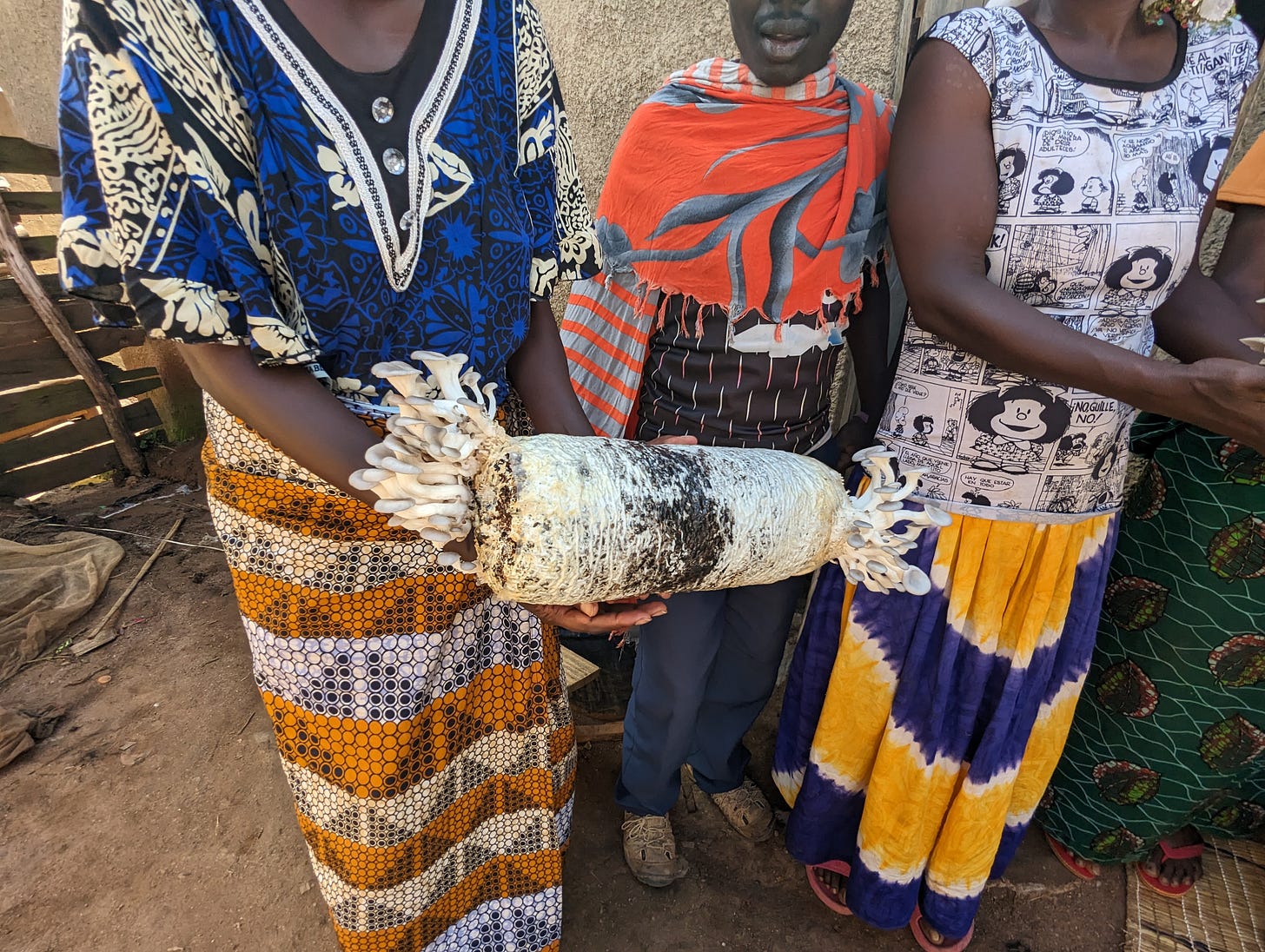
To open up new markets and expand the impact of this work, Hodari and Nourish All are driving the growth of a Refugee Mushroom Growers cooperative, connecting more settlements across Uganda to share resources and knowledge.
These initiatives could be impacting hundreds of thousands of refugees across 5 settlements, including Rwamwanja, whose permaculture-mushroom innovators will feature in my next episode, and Kyangwali, which we hope to visit on our next trip.
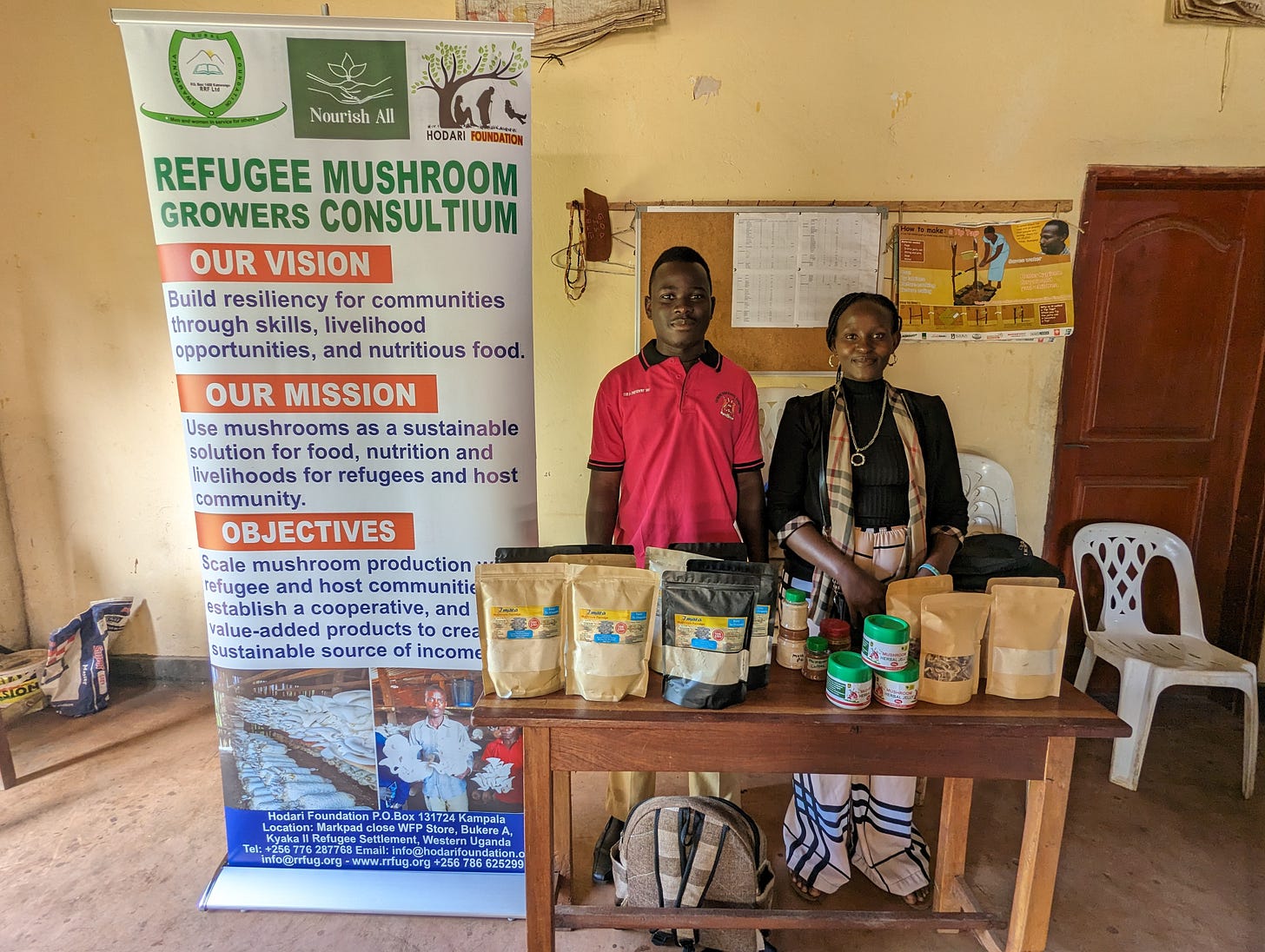
Mushrooms for planet and children
Permaculture ethics are demonstrated in Hodari’s circular system: the Hodari Centre manages a 2-acre permaculture garden and a child-refugee feeding and mentorship programme. Here, spent mushroom growing waste is collected and used as organic compost to feed the vegetable garden, enabling the soil to regenerate and produce higher yields. In turn, these vegetables help to feed around 125 orphaned children.
After fleeing violence in neighbouring countries such as DRC, unaccompanied minors find themselves in Uganda with no parents or relatives. Hodari provides a safe space where these children are cared for and brought together in healing through sharing their stories.
“This is people care: to care about other children because they need hope, they need a future, they need to grow and study, to be our future farmers. You can be who you are if you believe in yourself.”
- Janvier Hafasha, Founder and Executive Director of Hodari Foundation
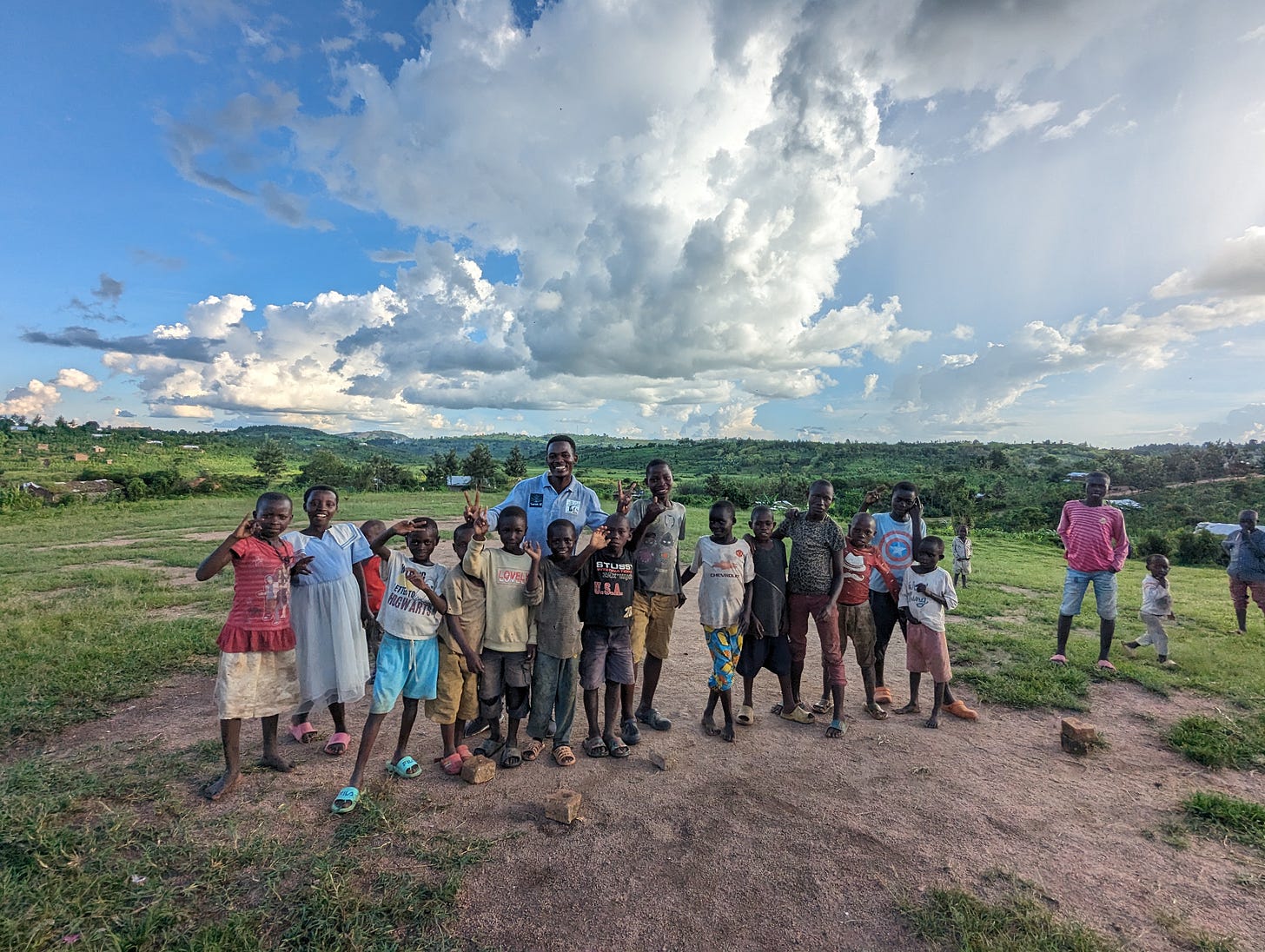
Dealing with the trauma of losing their parents and homes, children are encouraged to discover and nourish their skills and talents—singing, drawing, painting, sports, acrobatics performances, afrobeats dancing, cooking, gardening—to step out of the confines of refugee and orphan status and become empowered to identify as who they are.
“They need to feel loved. Some children lose their parents at a very young age. Their caretakers are given fresh and dried mushrooms (and mushroom soup) to help feed them and boost their nutrition and immunity. Organic mushroom soup is covering the gap of breastmilk.”
- Janvier Hafasha, Founder and Executive Director of Hodari Foundation
Check out Hodari’s YouTube channel with updates on the refugee child feeding programme, and a couple of reels on Running with Mushrooms’ Instagram where Janvier talks us through the programme in more detail. Currently, there is a need to build a centre which can act as a sheltered safe space for therapy and integration. At the end of this post are links for how to get involved 👇👇
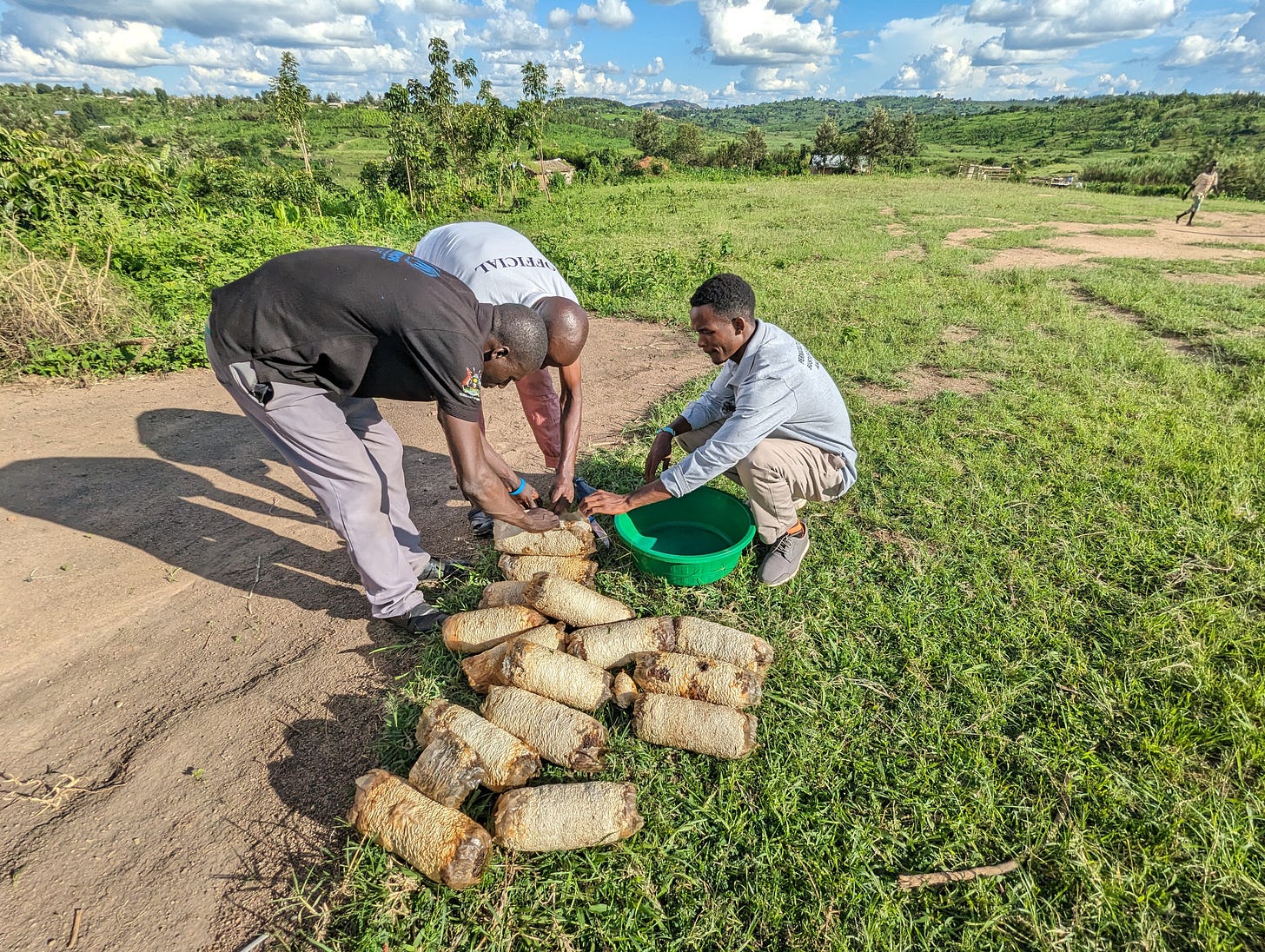
Every human deserves an equitable life free from poverty and food insecurity, with the ability to be adaptive to climate change.
Let’s take a step back to appreciate how important this kind of work is…
The refugee context in Uganda
As of December 2023, Uganda is host to around 1.6 million refugees and asylum seekers, most of whom are fleeing violence in South Sudan and the DRC. While the UNHCR (United Nations High Commissioner for Refugees) plays a big role in providing protection and assistance to millions of forcibly displaced and stateless people around the world, there is sadly a story here of massive underfunding, diminishing resources, and not much chance for people to return home. I wrote about this in more detail here.
An announcement issued in May 2023 by the World Food Programme and UNHCR breaks down how their limited food and cash resources are prioritised across the 13 refugee settlements in Uganda.
Around 95% of those with refugee status in Uganda are categorised as vulnerable or highly vulnerable and receive some food and cash assistance. After 6 months they are re-categorised, with around 4.4% of the refugee population considered self-reliant and receiving no more aid, like Janvier.
While assistance is welcome, it’s not enough.
In our podcast interview, Janvier describes the refugee experience and challenges facing those trying to support themselves in a foreign country, in a new language, with many odds stacked against them. We discuss how far these cash rations can take you (spoiler, it’s not far: the maximum cash allowance in southwestern settlements is 24,000 UGX per month, around $6, and more than 82% receive only 12,000 UGX, around $3. A bag of charcoal for a family to last the month costs 50k).
Mushrooms for mental well-being
In addition to the challenges to achieving prosperity, many of Hodari’s beneficiaries are survivors of sexual or gender-based violence. The process of preparing substrate, steaming, growing and packaging mushrooms has become a safe space for these women to share their unspeakable traumas.
Mushrooms are not only providing food security, nutrition and prosperity but also psychosocial support, ticking another SDG #3: Good health and well-being.
“Most of the women you saw are SGBV survivors who went through a lot when they were fleeing from DRC to enter Uganda. It's not only that we are training them but remember—as they are steaming, as they are draining, as they are packaging [mushrooms]—they are sharing their story. As they're sharing their story, they get to know, 'Oh I'm not alone, there is someone else'. It's like therapy and it's good for [their] mental health.”
- Janvier Hafasha, Founder and Executive Director of Hodari Foundation
None of the conflicts going on in the world, that cause people to flee their homes and live with refugee status, should be ignored. None of it should be allowed to happen! All of it poses unfathomable barriers to millions of individuals being able to live a desirable lifestyle.
It may be a grim picture, but it’s not only extreme — it’s reality.
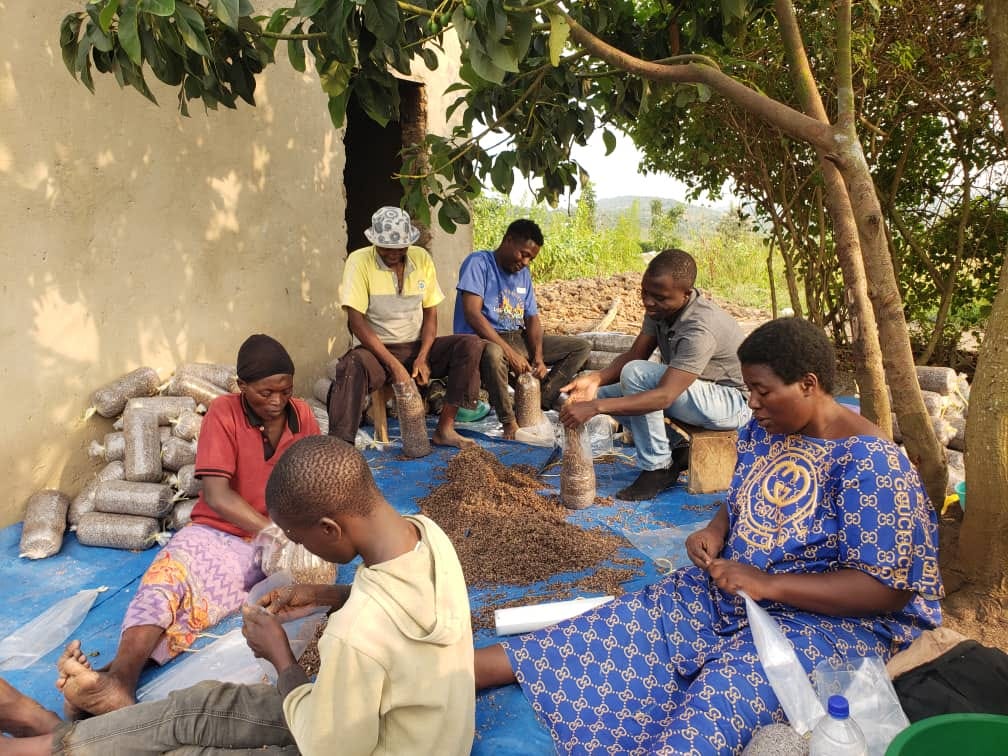
So is the world backwards? It’s complicated.
The brilliant MycoStories platform recently posted about how fungi, mycelium and biotech or ‘mycotechnologies’ can be effectively leveraged to address each one of the 17 SDGs in meaningful ways.
Socially, economically and environmentally, Hodari is delivering on this, but they shouldn’t have to. Responsibility has to also fall on the billionaire oil moguls, mega-corporations and systems that have created these issues in the first place.
Despite this, the impact of Hodari Foundation’s work is proof that, in the context of extreme challenges, community-based organisations can create an equitable, self-sufficient, prosperous and desirable way of living for people.
As Janvier says, “We called it permanent agriculture, and permanent culture.”
Full disclosure: Following my visit to Uganda several months ago, I have continued to engage with Janvier and the Hodari Foundation team, and have accepted Hodari's recent invitation to join their advisory board in support of their impactful work.
What’s in store for Hodari Foundation and how can you get involved?
Get involved: https://hodarifoundation.org/get-involved/
The future holds many possibilities for this huge community which is growing daily with new arrivals fleeing the war in DRC.
Hodari has ambitions to launch a value-addition hub in the office to display and sell new product innovations. Janvier’s ambition is to expand into medicinal mushrooms and democratise access to organic medicines in the settlement. A lab is needed for growing grain spawn on-site, to minimise contamination and cut transport costs. More solar dehydrators are needed (around £100 each) to avoid losing mushrooms to the Ugandan heat.
Please consider supporting Hodari Foundation, by volunteering in person or from afar.
There are many ways to get involved!
Thanks for reading! Mush love ❤️🍄
Thank you to Samantha Koches of Nourish All, for introducing Running with Mushrooms to the Hodari Foundation, and for the editing notes! You can listen to my podcast with Samantha here, and read my article based on Nourish All’s amazing work here.




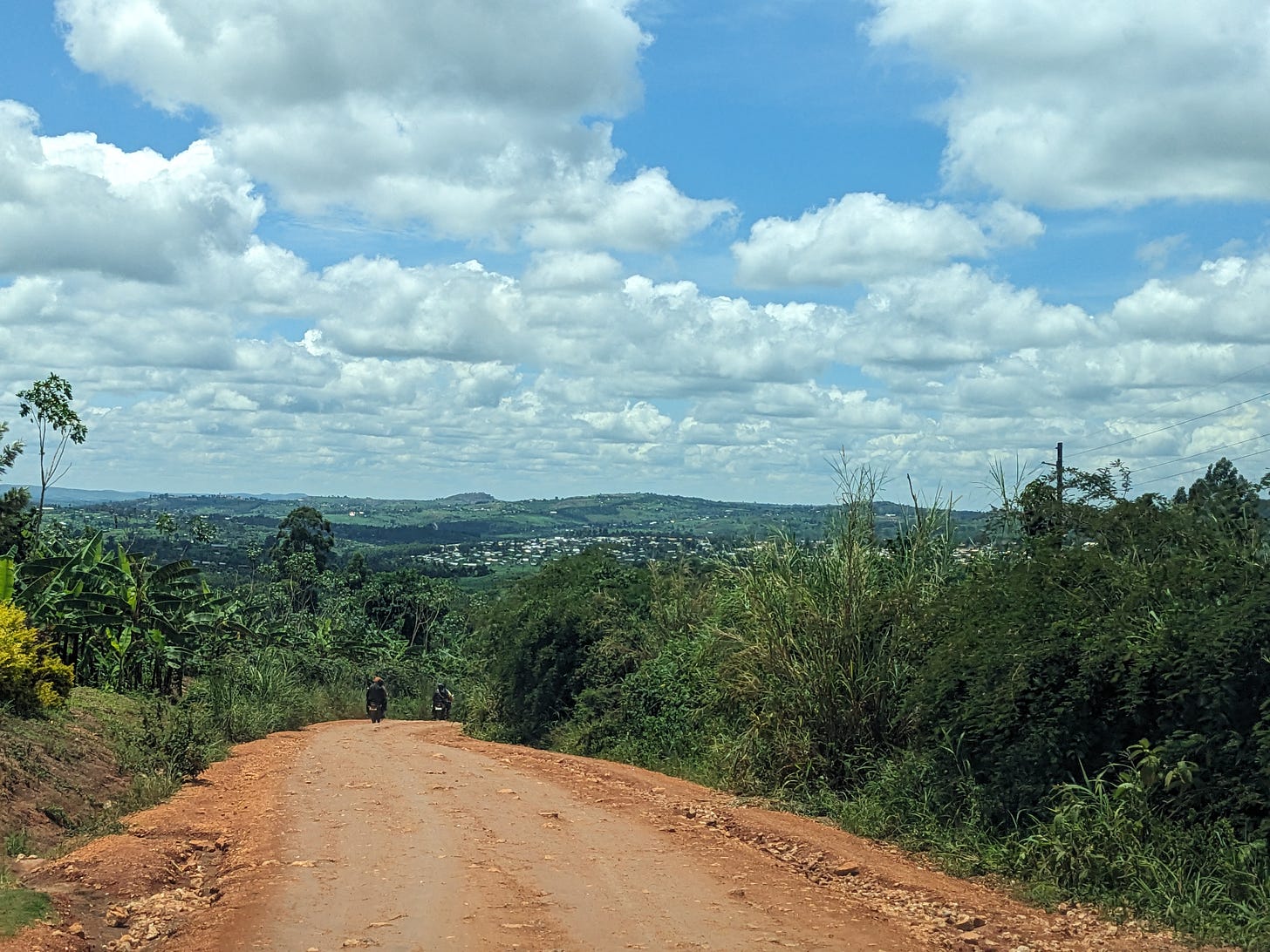
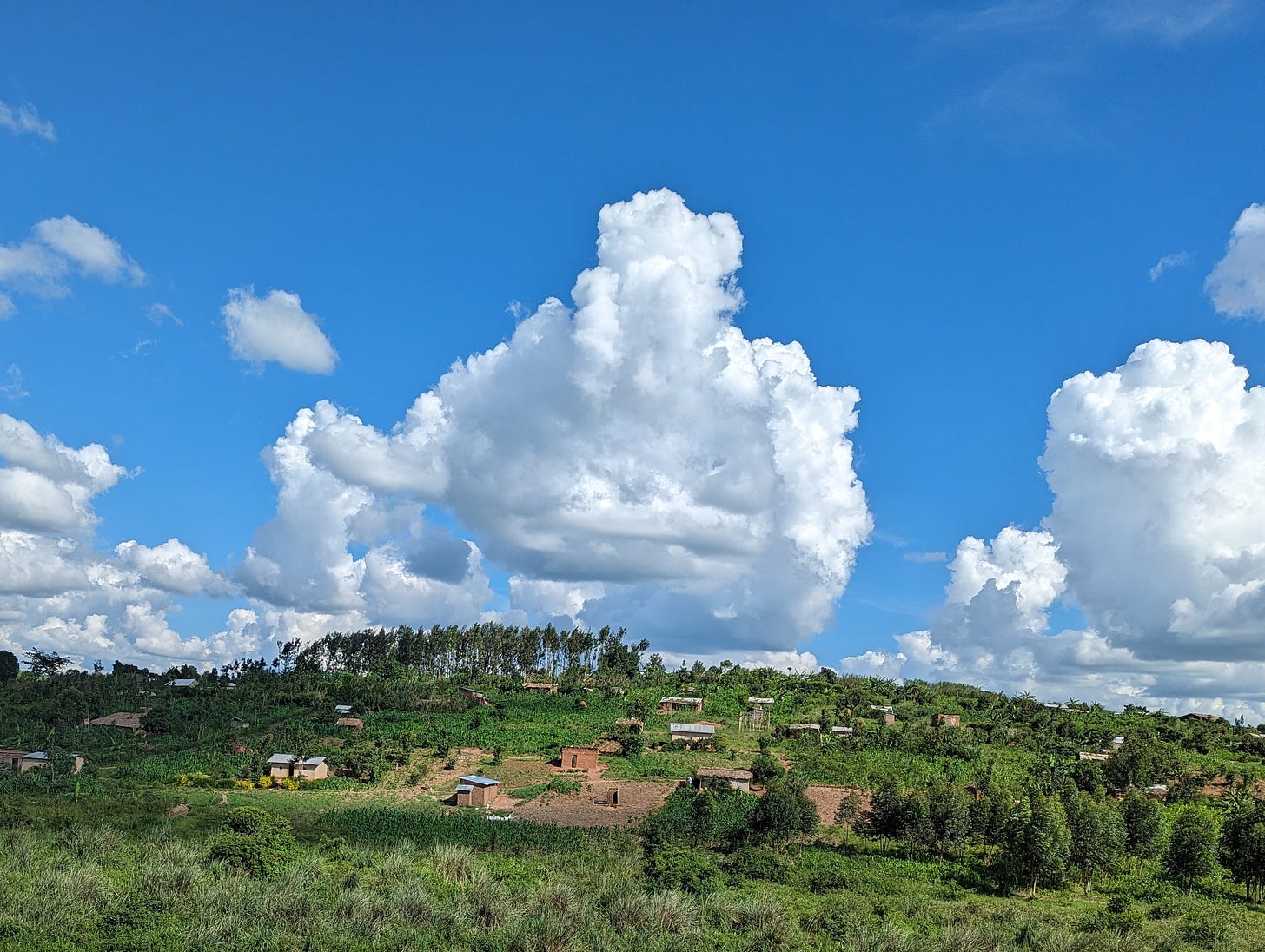
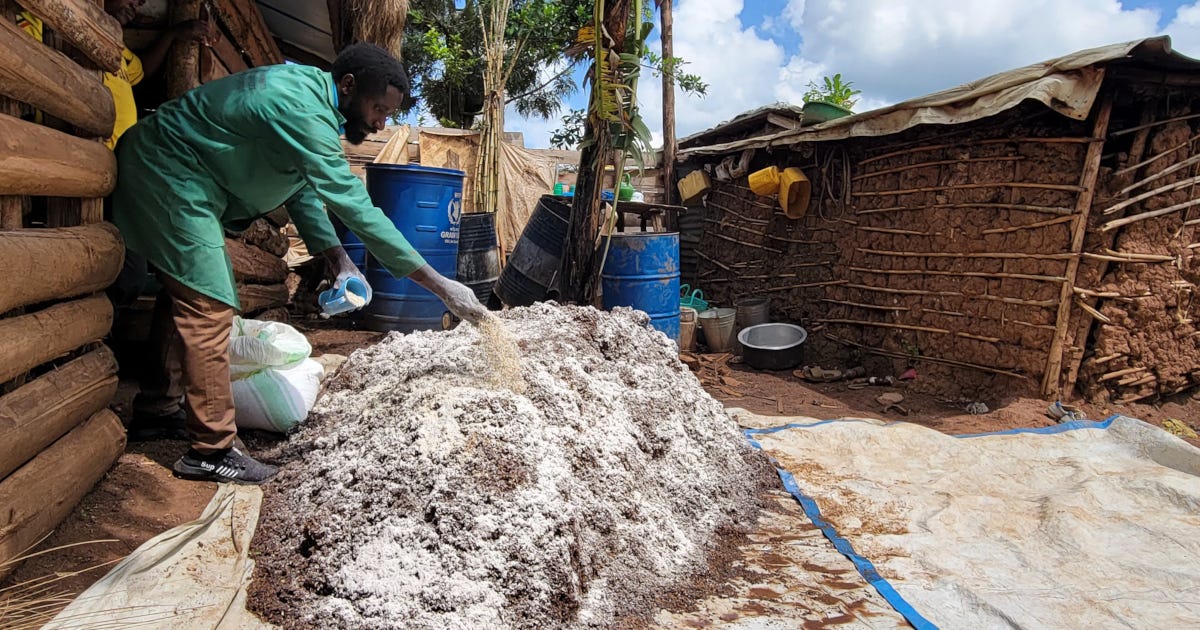
Thank you for excellent review of this important work. I am happy to read more about the Hodari Foundation. Such amazing dedication to so many people in need.